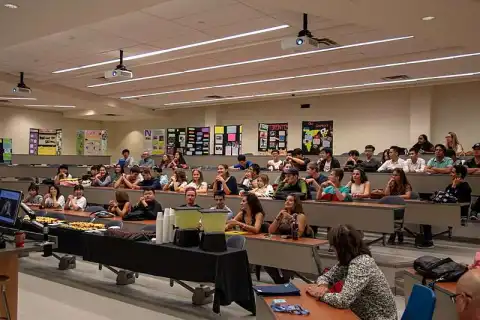Advanced Diploma - Game Development
- 3 years
- Duration
- 58,164 CAD
- Price
- Rolling admission
- Start
- Rolling admission
- Deadline
- Diploma
- Degree
- Campus
- Format
- Welland / Canada
- Location
Program description
Do you want to make your passion for video games your job and bring your creative ideas for games from paper to screen?
You are a leader in innovation in the digital gaming and interactive media sectors as a game developer.
Highlights
- Investigate, gain knowledge of, and hone your abilities in all the main game development disciplines, such as production, programming, design, and art.
- Hundreds of hours of hands-on, applied learning in state-of-the-art game development laboratories with dual monitors.
- The course material was centered on game development procedures, game design concepts, digital art creation methods, and game programming and scripting.
- Complete access to the best game creation tools available for programming, art, design, and production.
- Experience in both solo and group game development that leads to a group project to design, create, and present a unique game.
Program structure
Term One
- I-Think: The Science of Thinking and Problem Solving
- Communications for Media Studies
- Digital Graphics Techniques I
- Programming Essentials
- Game Design Fundamentals
- Database Essentials
Term Two
- 3D Animation
- Object Oriented Programming
- Digital Graphics Techniques II
- Game Engine Fundamentals
- Mathematics I for Computer Studies
Term Three
- Game Environment Design
- Game Theory
- Mathematics for Gaming
- Game Engine Programming
Elective Information
- Completion of additional General Education elective 1 course required
Term Four
- Advanced Game Programming Techniques
- Networking for Game Communities
- Rapid Game Development
- Character Design
- Physics for Gaming
Term Five
- Writing for the Gaming Industry I
- Artificial Intelligence for Gaming
- Game Development Project I
- Advanced Animation Techniques
- Mobile Gaming Space
Term Six
- Writing for the Gaming Industry II
- The Business of Gaming
- Game Development Project II
Elective Information
- Completion of additional General Education elective 1 course required
Price
Level One
- Tuition — 8,225 CAD
- Ancillary Fees — 1,965 CAD
- Material Fees — 80 CAD
- Level Total — 10,270 CAD
Level Two
- Tuition — 8,225 CAD
- Ancillary Fees — 1,005 CAD
- Material Fees — 0 CAD
- Level Total — 9,230 CAD
Year One Total: 19,500 CAD
Level Three
- Tuition — 8,225 CAD
- Ancillary Fees — 1,921 CAD
- Material Fees — 0 CAD
- Level Total 10,146 CAD
Level Four
- Tuition — 8,225 CAD
- Ancillary Fees — 961 CAD
- Material Fees — 0 CAD
- Level Total — 9,186 CAD
Year Two Total: 19,332 CAD
Level Five
- Tuition — 8,225 CAD
- Ancillary Fees — 1,921 CAD
- Material Fees — 0 CAD
- Level Total — 10,146 CAD
Level Six
- Tuition — 8,225 CAD
- Ancillary Fees — 961 CAD
- Material Fees — 0 CAD
- Level Total — 9,186 CAD
Year Three Total: 19,332 CAD
Estimated Program Total: 58,164 CAD
Requirements for applicants
Admission Requirements
- Ontario Secondary School Diploma (OSSD), or equivalent including the following required course(s):
- English – any Grade 12 (C) or (U), or equivalent
- Mathematics – any Grade 12 (C) or (U), or equivalent
Recommended Courses and/or Skills (these courses and skills may help you succeed academically in this program, but they are not required for admission)
- Computer and Information Science – Grade 11 (M) or Grade 12 (M)
- Information Technology Applications in Business – Grade 11 (O)
- Information Technology in Business – Grade 12 (C)
- Art or media courses
Language Proficiency Admission Requirements
You will be required to provide proof of one or more of the following:
- Niagara College Mature Student Test for English
- Grade 12 English at the C or U level (Ontario High School Curriculum)
- ACE English (Academic Upgrading)
- International Credential Assessment for studies outside of Canada
If English is your subsequent language, Niagara College (for the purposes of admission to standard non-competitive programs) will also accept these English Language Test Scores
- Cambridge English Exams (B2 First/FCE, C1 Advanced/CAE or C2 Proficiency/CPE) - 169 – No skill under 162
- International English Language Testing System (IELTS) including Indicator Test** 6.0 – No individual band under 5.5.
- Duolingo Language Test - Overall score of 105+, with no individual score under 95
- Internet-based (IBT) Test of English as a Foreign Language (TOEFL) including Special Home Edition Test - Paper-based: 500, Computer based: 173, iBT: 79, Minimum: 20 Writing, 20 Speaking
- Pearson Test of English (PTE) - 46+, with no individual skill under 36
- Canadian Academic English Language Test (CAEL) including CAEL Online Proficiency Test - 60 – No individual band under 50.
- Niagara College’s English for Academic Preparation program (EAP) - Completion of Level 5 English for Academic Preparation (EAP) program with 70% and no individual grade under 50%
About the university

Niagara College, with campuses in Welland and Niagara-on-the-Lake, is conveniently located in the center of the Niagara Region, only minutes away from one of the world's most popular tourist destinations. The college is home to more than 130 cutting-edge academic programs.
All of our campuses are home to state-of-the-art facilities and innovative teaching methods, including small class sizes, cutting-edge research, and real-world application.
These courses put students in an interactive and technologically advanced learning environment. Our grads are well-versed in multiple cultures, quick learners, and risk takers who push the envelope of what's possible in business in Niagara, Canada, and beyond.
Why Niagara College?
- 130+ certificate, diploma, apprenticeship and Bachelor's Degree programs
- 600+ credit, vocational and general interest courses
- We care about you and want you to succeed - employers report high levels of satisfaction with the skills and knowledge possessed by NC graduates.
- Building a sustainable future
- More than seven thousand students per year participate in cooperative education, field placements, internships, learning enterprises, apprenticeships, clinical placements, course-based research, and fieldwork in about one hundred different academic disciplines.





